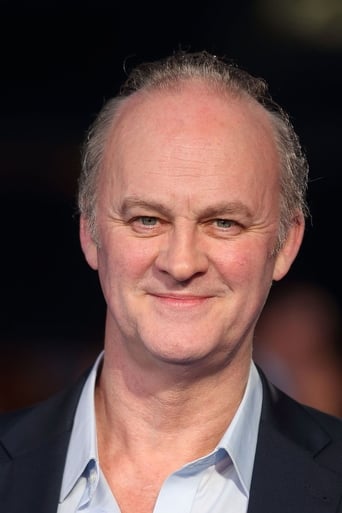Alicia
I love this movie so much
Solemplex
To me, this movie is perfection.
Megamind
To all those who have watched it: I hope you enjoyed it as much as I do.
Fatma Suarez
The movie's neither hopeful in contrived ways, nor hopeless in different contrived ways. Somehow it manages to be wonderful
mariahelleberg
Look to the title - the devil has been added to be able to draw audiences in. And Angelica is a sort of English "Angelique" - a piece of human meat being dragged through history. modern dialog and modern terms are used. boring and primitive. subplots lead nowhere. but, okay, there is a amount of fighting going on. swordplay and blood. almost as bad as Tudors. avoid! this is not an epic tale of a young woman's life during the English Civil War, but a badly told romp.I think that the problem is, that the creators want to write a drama for women (: female protagonist) and men (: fighting, torture, male bonding). There is absolutely no artistic reason to create this movie. But I like all the parallels to "Angelique". avoid! I mean it!
Dr Jacques COULARDEAU
The true story of Angelica Fanshawe, they say it is, but that is secondary to the real interest of this mini-series. Born close to the royal court of Charles I, married within that closed sanctuary, closed especially to what other people may think, and particularly repressive with all those that represented some kind of danger for the crown, she was confronted with a time when truth was the master word of everyone, love the premium of every one and yet the everyday reality was sectarianism and violence directed at all those who differed from you, no matter where you stood.Her story could be reduced to a series of husbands or to a series of man friends or to a series of failures with a successful birth at the end. That's what makes this film striking if not shocking at times with the extreme confrontation of the audience to excessive violence and all other types of executions, corporeal punishments, absolute deprivation of everything, victimization and injustice. And there is not one camp in this full array of differences that is better than the others.But I think this film goes a long way beyond these details and gritty small impressive elements. First of all it is rather clear on the "constitutional debate". The king is of divine nature and has no reason to share his power which is divine and absolute. Parliament, not clearly identified as the representative of the upcoming merchant bourgeoisie whose power was founded on the possession of the merchant fleet, of practically all ships in England, and the control over all sailors, is unable to get out of its small petty meaningless, except for them of course, effete and useless debate on some obtuse religious questions like predestination and the Eucharist, holy sacraments and contact with god, and eventually the right of the people (what people when parliament was elected by a few tens of thousands of propertied people?) to dismiss the king if his connection with the people (what people again.) got discontinued. They were no longer in touch, if they had ever been, with the needs and desires of simple people.The film insists in fact a lot on the Levelers, those people who defended the idea that the land was the property of those who tilled it and that everyone was supposed to share equally with everyone else. They were hunted by the king's men because they were seen as the most dangerous anti-royal enemies since they wanted the end of monarchy and the shift to an equalitarian republic. On the other side they were equally hunted by Cromwell's supporters because Cromwell was not for a republic, was a direct representative of the mercantile bourgeoisie and was against equal sharing, and yet at the same time he was not for a republic and believed deep in himself this country could only be one-handedly governed by a single man, which he resigned to do himself when no compromise could be found with the king.The film is absolutely silent, alas, on the various wars in their details: the two civil wars, and then the Irish war and then the Scottish war and then the war with Spain. The first two were against the king and ended with his bodily shortening. The next one was a bloody massacre based on the idea that Catholics had fallen down to lower than animals since they were able to let their own children starve, if not help them a little bit. The Scottish episode is not represented and the Spanish caper is not even mentioned because it confirmed a radical change that had started under Elizabeth I when she had to mobilize the country against Spain. In both cases the Parliament was the key to that demand because the owners of the ships and the employers of the sailors were all directly in parliament or represented in and by parliament. So Elizabeth gave some powers to parliament over taxation for example, in order to get what she wanted: ships and sailors. Cromwell went even further. He had to summon and convene a parliament he had violently disbanded.Why forget these events that are just coming to the beginning of the end in Ireland, that was solved in Scotland with devolution, and that is the basis of the tremendous move England was able to initiate in the Christian world towards a democratic parliamentary elective system that will take fifty years after the Glorious Revolution (1660) to establish fundamental human rights like Habeas Corpus, the freedom of the press and of publication. That's a shortcoming of great size in the film but that does not prevent us from feeling the happy ending of the Commonwealth in the Glorious Revolution that was to bring a new batch of difficulties and this time the peaceful revocation of the king by parliament in a law that will establish the first constitutional monarchy in the world, a real first step towards the American Revolution and then the French Revolution.After this period no one could say like Charles I: "Give me one instance of a king being dismissed by a parliament!" Charles I was the first in 1649. James II will be the second in 1688. That's really the end of feudalism and its theory of absolute kings by divine appointment.But nevertheless the show is beautifully filmed and grandiosely performed.Dr Jacques COULARDEAU
Blueghost
Well, I had high hopes for this mini series from across the Atlantic, and some of those expectations were met, but, as I should have expected, others were dashed.The production values are of high caliber. Costumes, sets and locations, particularly for a British mini series, are all exceptional. There's very little in the way of criticism when it comes to poking at the amount of money and care that went into the recreation of late renaissance Britain. Truly, a first rate production where all imagery is concerned.So where does this small collection of films fall flat? This is going to sound sexist, but it truly isn't, it's a comment aimed at the continued market trend for television; the series was aimed specifically at a female audience with only the superficiality of placating to masculine interests. Every male in this series of films is portrayed as boorish on some level. From Royalists to Parliamentarians, and shades of gray in-between, few of these men have a spine.Additionally, they're all sex starved. They either are biding their time for sexual favors, or are so wanton as to be willing to force themselves on he fairer sex. They seem to have little else on their minds. And when they are granted female accompaniment, they then squander their "victory" in some sort of stupidity.That's not really a comment on what I think of society as I think of what TV producers think their audiences want to see. Again, as I've written in other reviews, the TV producer thinking is that since women buy things for the home, it is therefore that audience that the shows must cater to. "The Devil's Whore" is no different. The concepts and ideals for which both sides of the English Civil War fought are hardly ever mentioned. It seems to be the assumption that said notions have no place within the female psyche, and therefore are not worth exposition. Female concerns are for family, friends and young ones.So what does one do? The man who watches this can do little but shake his head, and maybe say "Huh, the 60's film with Richard Harris was a bit more entertaining..." Which, in my view, it was.But the film with Harris had the benefit of being a high budget major theatrical film. It wasn't some one off made for TV mini series that had to compete with "Dancing with the Stars" or other sub-IQ fodder that masks for entertainment.You may say, "Mister Blueghost, what were you expecting?" Look, I knew this was going to be a TV miniseries about a woman during the English Civil War, but I expected the Powers-that-Be in the UK to do their usual bucking of American market research, and make a film for both sexes and most ages. Something intelligent. Something with a little more purposeful action than the banal placation presented in this film's battle-sequences.In short, it was a pleasure to see something not made by and for American house-wives and professional women, but it was equally disappointing to see something made for British house-wives and professional women.*sigh*Well, maybe I'll whip out my copy of Cromwell tonight, and grin as I see Richard Harris give a high energy performance in his Irish-thesping style of portraying a historic figure who didn't like the Irish a great deal.Well, I think I've learned my lesson about splurging on a UK TV series of which I know nothing.Watch at your risk.
Zagreb-1
An extremely-engaging and well-acted drama about the period 1642-1660 covering the English Civil War and the subsequent execution of King Charles I and his replacement with England's only republican government. Whilst the history has been simplified with many important characters left-out, this nonetheless sticks to the history quite well. As with HBO's "Rome" fictional characters are invented and their own stories are told alongside those based on historical fact; some historical incidents are also embellished or altered slightly to make them more dramatic.Screenwriter Peter Flannery focuses on the politics of the wars for much of the time and helps scotch the myth deliberately built-up in the aftermath of the 1660 restoration that what happened in England was not a revolution but instead a temporary falling-out leading to an "interregnum". It's true that many of the parliamentary forces were never interested in overthrowing the monarchy but events overtook them and they found themselves embroiled in civil strife as radical forces such as the Levellers and the Diggers threatened to overwhelm not just the monarchy but the Parlimentary landed aristocracy. Whilst England was a republic following the King's execution it was no democracy and the conditions that lead to the betrayal of Cromwell's allies and his own rise of near unassailable-power are simplistically but dramatically detailed.The acting was, in general, of a very high quality with the best performances coming from Peter Capaldi as Charles I and Dominic West as Cromwell. Both managed to portray these deeply-flawed men as more than the monstrous caricatures history can present them as. Tellingly, two of the most emotionally engaging moments in the series for me were King Charles, sentenced to death and stripped of his arrogant autocracy, saying goodbye to his children and Cromwell preparing to be installed as Lord Protector talking to his old comrades in arms who had become his honour guard and reflecting on the fact he had betrayed his own revolution.For me, there were only a few flaws with this series. Edward Saxby, whilst well-played by John Simm, often felt like too much of a "modern" man with his tendency to attack what we can now see as inconsistencies on the Cromwellian side. Similarly, Angelica appeared too much of a modern woman and the scene where she addressed a church and told them there was no heaven and hell (something that would probably have seen her attacked by a mob in the 1650s) was slightly farcical. I also felt that the ending was too optimistic. Yes, Angelica had defeated her personal demons but all that her loved ones had fought for remained in tatters with the restoration simply turning the clock back and I felt that this should have been reflecting in a more sombre conclusion.Overall, though, this is a highly-enjoyable piece of historical drama and an excellent introduction to an important and much-misrepresented period of English history.




